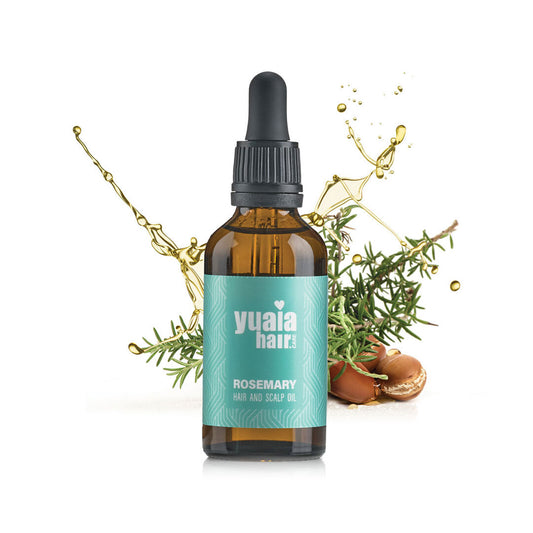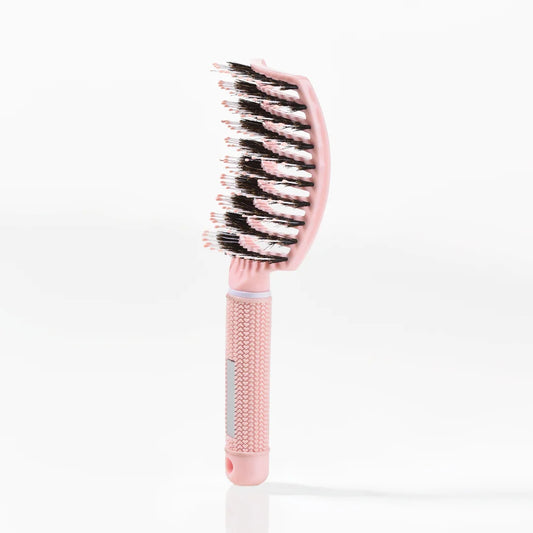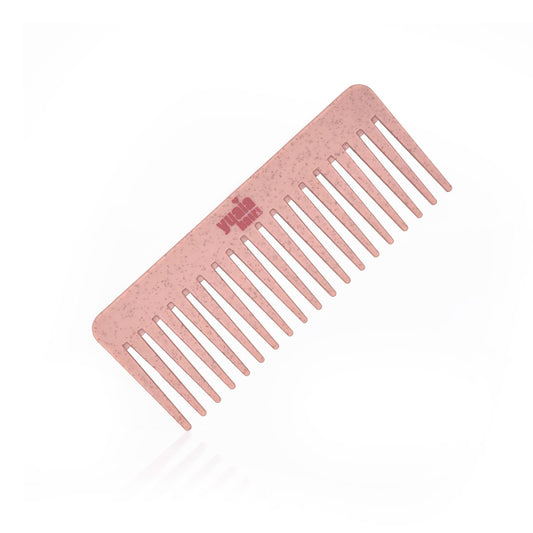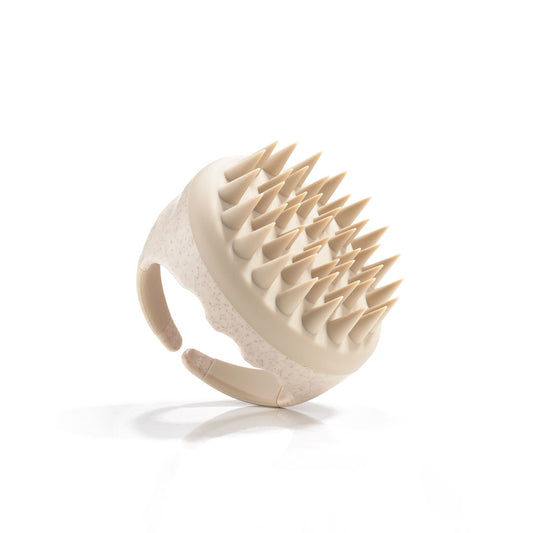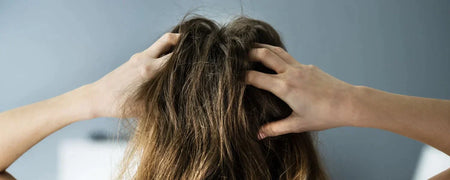
Symptoms of scalp eczema
Redness, irritation, flaking, rash, and itching are some of the most common symptoms of scalp eczema. Red patches and crusts can also be clear symptoms of scalp eczema, especially in more severe cases. This can be due to stress or an overproduction of sebaceous glands, which create an itchy and irritated scalp. Skin peeling and dandruff may also occur as the inflamed skin releases dead cells. If not treated in time, this can lead to sores or weeping sores on the scalp. Scalp eczema can also worsen by using hair products that further irritate the skin, so it's important to choose mild and gentle products.
It's important to seek treatment for scalp eczema to avoid further irritation and discomfort. Treatment varies depending on the cause of the eczema - it could be fungus or seborrheic eczema - so it's always recommended to consult a doctor for proper diagnosis and treatment. An effective treatment will relieve symptoms such as itching and reduce skin peeling while preventing future outbreaks of scalp eczema.

Causes of scalp eczema
Genetic predisposition may play a role in the development of scalp eczema. People with family members suffering from eczema or other skin conditions are more likely to develop it themselves. Dry skin/dry scalp or oily hair or oily scalp can also lead to itching and dandruff on the scalp. The sebaceous glands produce too much oil, which makes the hair greasy and creates a breeding ground for fungus.
Allergic reactions or stress can also be the culprits behind itchy flakes on the scalp. When the body is exposed to allergens, the immune system can overreact, resulting in inflammation in the scalp. Stress increases the production of hormones like cortisol, which can lead to inflammation and dryness in the body, including the head. Prolonged stress can also make it more challenging to treat eczema, as it weakens the skin's ability to heal.
Treatment of eczema and dandruff in the scalp should always be assessed individually based on a consultation with a personal physician to clarify the underlying cause as well as the extent of symptoms. Possible treatment options may include medicinal shampoo for fungus (if caused by this), steroid creams, and changes in diet or lifestyle when relevant. One of the most effective ways to alleviate symptoms is by identifying and eliminating triggering factors, such as certain hair products or foods that can exacerbate scalp eczema.
Is scalp eczema hereditary?
Yes, scalp eczema can be hereditary. Research has shown a genetic factor that can play a role in the development of scalp eczema. If multiple family members have scalp eczema, the risk of developing it yourself is higher. However, this does not mean that it is guaranteed that you will develop scalp eczema if it runs in your family. Other factors can affect whether you develop eczema, such as stress, diet, or environmental factors. If you experience symptoms of scalp eczema, it's important to seek treatment from a doctor or dermatologist for a proper diagnosis and treatment plan.
Is eczema on the scalp contagious?
Eczema on the scalp is not contagious as it is not caused by an infection. It is an inflammatory condition where the skin on the scalp becomes red, scaly, itchy and sometimes painful. The causes can vary from dry skin, allergies, stress, hormonal changes or an autoimmune disease. It is important to seek medical attention to identify the cause of the eczema and receive appropriate treatment. The use of shared combs, brushes and hair accessories should be avoided as this may worsen the condition or spread any infections that may occur. A good hygiene regimen and a healthy lifestyle can also help prevent the appearance of scalp eczema.
Treatment of eczema on the scalp
Eczema on the scalp can be irritating and bothersome. An effective treatment for scalp eczema includes the use of special shampoos designed to relieve itching and irritation. These shampoos contain active ingredients such as salicylic acid, sulfur or tea tree oil that help soothe and heal the skin.
If you prefer natural remedies for scalp eczema, consider applying aloe vera gel or coconut oil to the infected area to reduce inflammation.

However, it's always important to consult a doctor before starting any new treatment method for scalp eczema. A doctor can help determine the cause of the eczema and suggest the most effective treatment, especially if the symptoms are severe or persistent. Furthermore, it may also be beneficial to avoid stressful situations as well as harsh chemicals like hair dyes or styling products to minimize the risk of further skin irritation. Stress management and the use of gentle hair care products can significantly help keep eczema under control.
How is eczema on the scalp treated?
Using medicated shampoos and lotions can be effective in treating scalp eczema. These products contain ingredients that help relieve itching and inflammation, such as salicylic acid and sulfur. It is important to follow the manufacturer's instructions carefully so as not to overuse.
Use of steroid creams or ointments can also be an option for treating eczema on the scalp. These products contain strong anti-inflammatory ingredients that help reduce redness and irritation in the area. However, it is important to use these remedies only after consultation with a doctor or skin specialist, as they have side effects with long-term use.
Light therapy can also be an effective way to treat scalp eczema. This type of therapy emits specialized light to the affected area and reduces inflammation as well as itching. Light treatment usually requires several sessions with a skin specialist before visible results are achieved.
Natural remedies and home remedies for eczema on the scalp
Tea tree oil, aloe vera gel, and coconut oil are all natural remedies that can be used to treat scalp eczema. Tea tree oil has antimicrobial properties and can help relieve itching and inflammation in the scalp. Aloe vera gel is known for its soothing properties and can reduce redness and irritation in the scalp. Aloe vera also works as a natural moisturizer, promoting skin healing and reducing inflammation. Coconut oil also soothes the skin while containing fatty acids that promote the healing of damaged skin. It is especially useful for moisturizing dry skin and restoring the skin's natural barrier, which is essential for keeping eczema under control.
It's important to note that these remedies should only be used after a thorough consultation with a doctor or dermatologist. Natural remedies can support symptom relief, but they do not replace medical treatment when eczema is severe or persistent. They should not be used as an alternative to medical treatment or diagnosis of scalp eczema.
Prevention of eczema on the scalp
Using mild, gentle products for hair washing and styling is an effective way to prevent scalp eczema. It is recommended to choose products free from fragrance, parabens, and sulfates, as these can irritate sensitive skin and worsen eczema. Sulfates can dry out the scalp, while fragrance and parabens can cause allergic reactions that exacerbate eczema symptoms. It's also important to ensure thorough rinsing after using hair washing products to avoid the buildup of product residues and chemicals on the scalp. Residue buildup can block pores and cause irritation, increasing the risk of eczema flare-ups. Furthermore, avoid excessive heat from hairdryers and straighteners, as this can dry out the scalp and increase the risk of irritation.
Other tips for preventing scalp eczema include:
- Use a soft brush or comb to detangle your hair to avoid unnecessary scalp irritation.
- Be cautious with frequent coloring or perm treatments.
- Eat a healthy diet with plenty of fresh fruits and vegetables.
- Stay hydrated by drinking plenty of water each day.
By taking these simple steps, you can reduce the risk of developing eczema and other skin irritations in your scalp. Prevention is especially important for those who have previously had problems with eczema since even small measures can prevent future flare-ups. Early intervention can prevent future flare-ups.
The Impact of Scalp Eczema on Hair Health
Many people search for "how to get rid of scalp eczema". However, there is no permanent cure. Eczema is also known as atopic dermatitis. It is a chronic skin condition that can cause itchy, red, and inflamed patches anywhere on the body, including the scalp. Scalp eczema appears as dry, itchy patches on the scalp. Scalp eczema can negatively impact hair health, as constant irritation and inflammation can weaken hair follicles. It can also lead to crusting, flaking, and even temporary hair loss.
Today, we will explain how scalp eczema can affect your hair and what you can do to manage the symptoms and keep your hair healthy.
How Does Scalp Eczema Affect Hair?
Before we dive into how to cure scalp eczema, we need to explore how scalp eczema affects your hair.
Scalp eczema can significantly impact the health and appearance of hair. The condition often causes itching, redness, and flaking in the scalp, leading to discomfort and embarrassment. In severe cases, the constant itching and inflammation can damage hair follicles. This can lead to hair loss or thinning.
Dandruff and flakes from scalp eczema can also make the hair look dull and unkempt. You can manage scalp eczema with proper treatment and care.
Hair loss due to scalp eczema
Scalp eczema can cause temporary hair loss as the inflammation damages the hair follicles, making it difficult for hair to grow. The intense itching that often comes with it can lead to scratching the scalp, which further damages the hair follicles. Additionally, crusting and flaking can block hair growth.
Fortunately, hair loss caused by eczema is typically temporary, and the hair usually grows back once the eczema is treated. By using gentle treatments such as medicinal shampoos and moisturizers, one can help reduce hair loss and support a healthy scalp. It's important to choose products that are specifically designed for sensitive skin and avoid harsh chemicals that can exacerbate eczema.
What Triggers Scalp Eczema?
There is no single cause for scalp eczema. Various environmental, physical, and chemical factors can all impact the skin and contribute to the development of scalp eczema. Let's explore some common culprits that might ignite your scalp:
- Weather: Dry, cold winters and hot, humid summers can wreak havoc on sensitive scalps.
- Stress: Feeling overwhelmed? Stress can worsen eczema symptoms, including scalp irritation.
- Product Use: Harsh shampoos, dyes, and styling products packed with chemicals can irritate your scalp. Products with sulfates, fragrances, or alcohol can dry out the skin and cause inflammation, leading to eczema flare-ups.
- Allergic Reactions: Allergies to ingredients in hair care products, fragrances, or even certain foods can trigger flare-ups.
- Sensitive Scalp: Some people have naturally sensitive skin. It makes their scalps more prone to eczema outbreaks.
Unforeseen Triggers for Scalp Eczema
Here are some other triggers of scalp eczema.
- Sweat: Excessive sweating during exercise can irritate your scalp, especially if you don't rinse thoroughly afterwards.
- Dandruff: Dandruff can sometimes worsen eczema symptoms or even be a symptom itself.
- Underlying Conditions: Certain medical conditions like asthma or allergies can increase your risk of eczema flare-ups.
- Diet: Some people find that certain foods, like dairy or gluten, trigger their eczema.
Remember: Consulting a doctor can be immensely beneficial. They can diagnose your scalp eczema, identify specific triggers, and recommend the best treatment. This will also help prevent scalp eczema from becoming a recurring and uncomfortable condition.
How To Treat Eczema On The Scalp
There is no cure for scalp eczema, but there are ways to manage the symptoms. It will help you keep your hair healthy. Scalp eczema can be a challenging condition to treat, but by taking the right precautions, symptoms can be significantly reduced. Here are some tips for managing your condition:
- Use gentle shampoo: Use a mild, fragrance-free shampoo that is gentle on the scalp. Avoid shampoos with harsh chemicals that can irritate the skin.
- Keep your scalp clean: Wash your hair regularly to remove dirt, oil, and flakes. However, avoid over-washing, as it can dry out the scalp and worsen eczema symptoms.
- Avoid irritating substances: Avoid using hair products that contain alcohol, fragrances, or other harsh chemicals that can irritate the scalp.
- Moisturize regularly: Keep your scalp hydrated by applying a moisturizer or emollient to the affected areas. Use products specifically developed for sensitive skin. Moisture is a key factor in reducing dryness and itching associated with scalp eczema.
- Use medicinal shampoo: In cases of severe scalp eczema, your doctor may recommend using medicinal shampoo to reduce inflammation and flaking.
- Prescription medication: In severe cases, your doctor may prescribe creams or oral medications to help reduce inflammation and itching.
- Avoid scratching: Try to avoid scratching your scalp, as it can lead to infection. If you have an uncontrollable urge to scratch, try using a cold compress or an anti-itch cream to relieve the itch.
- Manage stress: Stress can worsen eczema symptoms, so try to manage stress through relaxation techniques such as yoga, meditation, or deep breathing exercises.
- Seek professional help: If your scalp eczema is severe or does not improve with home remedies, it is important to visit a dermatologist for a proper diagnosis and treatment. A dermatologist can assess your situation and recommend a treatment plan tailored to the specific needs of your skin.
Remember, eczema is a chronic condition that can flare up from time to time. By following these tips and working closely with your healthcare provider, you can effectively manage scalp eczema and reduce its impact on your daily life. Consistent care and prevention are the best ways to minimize flare-ups and maintain a healthy scalp.
 2-5 day delivery
2-5 day delivery
 25.000+ satisfied customers
25.000+ satisfied customers
 Satisfaction Guarantee
Satisfaction Guarantee



















